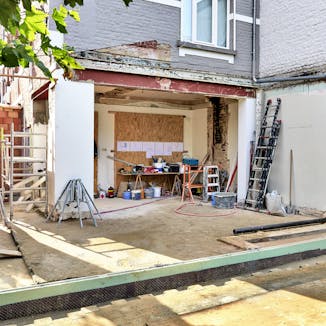Compare home improvement loans and check your eligibility. Read our handy guide to understand home improvement loans and how to find the best option for you.
Get a decision within an hour
Quote won’t affect your credit score
Poor credit & arrears accepted







These products are only available via a broker and can't be applied for directly
We're on a mission to improve the finances of the nation by helping you to spend wisely and save money



We're on a mission to improve the finances of the nation by helping you to spend wisely and save money



By Matt Fernell, Editor-in-Chief at Finance.co.uk.

Loans for home improvement are ideal if you’re looking to renovate a property. Here’s how to find the right loan for your home improvements.
To find the right loan to finance your home improvements, it’s important to work out what type of loan you need first.
There are two main types of loans you can use: secured loans and unsecured home improvement loans.
The type of loan that’s best for you will depend on how much you need to borrow and your financial circumstances:
Also known as homeowner loans or renovation finance, these loans work by borrowing money secured against your home. To qualify for a secured house improvement loan, you need to own or hold equity in a property.
Secured loans are used when you need to borrow a large amount of money, so they could be your best option if you are planning a major renovation project or your property requires structural repairs.
Lenders see secured loans as a lower risk because your property is being used as security. For this reason, you are more likely to be accepted for a secured loan if you have a poor credit history, and they often come with lower interest rates.
Unsecured personal loans are a more straightforward way to borrow because you don’t need to provide collateral or have a mortgage.
This type of loan is more suited to smaller home improvements such as a kitchen installation, bathroom fitting or redecoration.
Interest rates are higher unless you have a good credit score, but repayment terms are shorter, and there are no fees, so the overall cost of the loan could be cheaper.
Using a loan broker helps you find the right loan for your home improvement needs.
We can check your eligibility and help you compare home improvement loan quotes; we just need to understand:
How much you want to borrow
The reason you’re borrowing for
How long you want to borrow the money over
We can use this information to work out what type of loan would be right for you. If you want to borrow a large amount, e.g. £10,000 or more, we’ll ask you about your property, including:
If you’re a homeowner
Your current address
Your mortgage balance
The approximate value of your property
We’ll be in touch to let you know if you’re eligible for the loan you want and provide quotes for loans that work for you.
Before you apply for a home renovation loan, you need to understand exactly what you need to find the best deal for your circumstances.
Borrowing money is a big commitment, and there are some critical considerations before choosing a loan for home improvements:
How much you need to borrow: The amount you need should determine whether you take out a secured or personal loan. Don’t borrow more than you need, and if it’s less than £25,000, a personal loan could be a better option.
Whether you want to risk your home: Decide whether it is worth borrowing against your home or whether you can raise funds another way. Do you have other collateral if you can’t keep up repayments?
Whether you are eligible: The amount you can borrow and the interest you pay will depend on your credit record, so it’s important to know your score before you apply for a loan. Do a soft search before applying to avoid hard searches on your credit report.
Whether you can afford it: You need to be sure you can afford any repayments now and in the future. Secured loans are a long-term commitment, and your financial circumstances could change.
How long you need to repay the loan: Work out what you can afford to repay each month and opt for the shortest term so you don’t overpay on interest.
How much home equity you have: You’ll need an up-to-date valuation of your property and the outstanding balance on your mortgage if you choose secured borrowing.
There is a risk of losing your home if you fail to keep up repayments, so think carefully and make sure you understand all the risks before committing to a secured home improvement loan.
Home improvement loans are a great way to spread the cost of house renovations and DIY projects that would otherwise be difficult to afford. Renovation finance can:
Fund home improvements that increase the value of your property
Allow you to spread the cost of building work and materials
Cover short-term cashflow when projects don’t go to plan
Help you manage your project finances in a controlled way
While there are lots of benefits to using a loan for house renovations, there are also reasons to be cautious:
You could damage your credit score if you default on repayment
Defaulting on a secured loan could mean your home is repossessed
Fees and penalties for late or missed payments could increase your debt
Paying off your loan early could mean paying early repayment fees
If you can afford to pay for DIY projects or refurbishments with cash or savings, use those first.
If your financial circumstances change and you struggle to repay your house improvement loan, you could hurt your credit score or even put your home at risk.
The information provided does not constitute financial advice, it’s always important to do your own research to ensure a financial product is right for your circumstances. If you’re unsure you should contact an independent financial advisor.
Home equity is the value of the property portion that you own if you have a mortgage. An easy way to understand equity is to subtract the amount you owe from the value of your home. So, if your home is worth £300,000 and you still owe £100,000, the home equity is £200,000.
Yes, once you have the money in your bank account, it’s up to you what you do with it. However, your home is at risk if you default on a secured loan, so only take on a renovation loan if it increases the value of your home.
Not always - in fact, it’s a good way to boost your credit rating. If you’re approved for a secured loan and have poor credit but make your repayments in full and on time, you will be taking steps to help build your credit score.
If you have a home improvement loan secured on your property, you will need to get permission from your lender to sell your house.
It will depend on the lender and your circumstances. Bear in mind that pausing payments will increase the overall cost of your loan as you’ll take longer to repay it.
The amount you can borrow will depend on your financial circumstances, your homeowner status and whether you apply for a homeowner or personal loan.
Personal loans generally allow you to borrow up to £25,000, although interest rates can be higher if you don’t have a good credit rating and you’ll have to repay within seven years.
Secured house renovation loans tend to be for anything between £10,000 and £100,000, although you can borrow more if you have enough equity to release from your property.